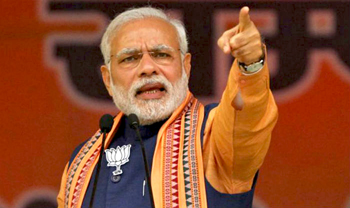New Delhi, Nov 27: With Jan Dhan accounts witnessing a surge in deposits, Prime Minister Narendra Modi today issued a warning to those using poor people to park their illegal money, saying the strict 'benami' law would be implemented against such transactions.
He appealed to the people to shift to cashless system of transactions and asked the youth to help in this process by educating the elders and those not literate.
 In his monthly radio programme 'Mann ki Baat', first after the demonetisation decision, Modi devoted substantial part of the 37-minute broadcast to the issue over which he is under opposition attack.
In his monthly radio programme 'Mann ki Baat', first after the demonetisation decision, Modi devoted substantial part of the 37-minute broadcast to the issue over which he is under opposition attack.
He also spoke about the Kashmir situation and particularly hailed the massive attendance of students in board exams recently.
Focussing on demonetisation, the Prime Minister said "even now, some people think they can bring their black money, the money earned through corruption or the one which is unaccounted for, back into the system through illegal means.
"Unfortunately, they are misusing the poor for this purpose by misleading, luring or tempting them by putting money into their accounts."
He said "a very stringent law to deal with 'benami' transactions is being implemented, that will make such things (transactions) very difficult. Government does not want the people to face such difficulties."
"I would tell such (unscrupulous) people that to reform or not reform is your wish. Following the law or not is your wish - that the law will take care of. But please don't play with the life of the poor. Don't do anything due to which, when there is an investigation, the name of the poor comes on record and he gets into trouble because of you."
However, wrong practices have become so entrenched that some people were still not mending their ways, he said, adding "these people are trying to find ways to again bring their ill gotten wealth, black money, benami and unaccounted cash back in to the system. They are scouting for illegal ways to save their black money and unfortunately even in this pursuit they are looking to misuse the poor."
The Prime Minister congratulated the people for facing difficulties but supporting demonetisation to fight graft and black money.
Efforts are being made to mislead the people against demonetisation, but they were making sacrifices for a better India, he said while appealing to the youth, "the true soldiers", to lead the battle against corruption.
Modi said "our dream is for a cashless society. It is correct that we cannot achieve it immediately. But India can definitely move towards a less-cash society. Once we start the move towards a less-cash society, the goal of a cashless society will not be far away."





Comments
there are 20 crore jandhan accounts ... if one family consists of 3 members ,, 20x3 = 60 crore people will vote against Feku... we have nearly 80 crores on voters list, then 75 % are against FEKU, and feku bhad me jayega.... feku is nicely screwed ...
Add new comment